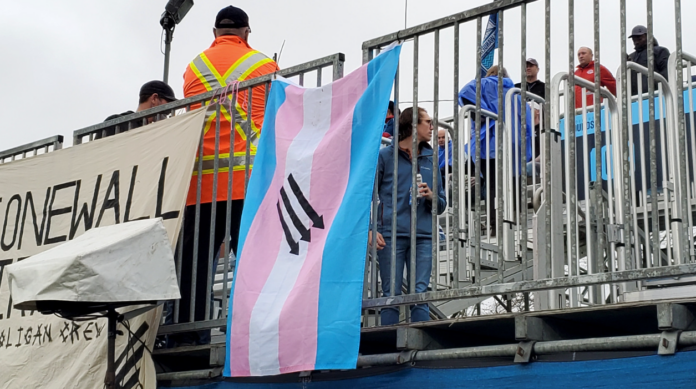

Nicki Lyons-MacFarlane, chair of the Imprint Youth Association, had received online hate in the past, but after becoming a critic of New Brunswick’s policy 713 revision, the hate intensified.
From being called “groomer” or some variation of it, to their mental health being constantly on blast, Lyons-MacFarlane has seen the worst side of Twitter and even received angry emails.
“I’m in disbelief that we are going backwards,” they said. “This rhetoric is being ramped up.”
As a non-binary person, Lyons-MacFarlane believes policy 713 as originally drafted was a “step forward” for trans and non-binary kids in schools.
“It was really scary not knowing what [the province] meant by review.”
Related: ‘Thrive, not just survive’: Take Back the Night highlights 2SLGBTQIA+ youth
Recently, on Oct. 25, the Canadian Civil Liberties Association (CCLA) held a hearing to determine whether it was in the public interest to pursue their lawsuit against Bill Hogan, the Minister of Education and Early Childhood Development of New Brunswick.
Acadian drag queen Annabelle Babineau, known as Barb Wire, has also noticed a spike in hate compared to previous years. She said she has gotten four death threats in the last year and one of her shows in the small rural community of Restigouche got cancelled due to threats of violence.
“These attacks on drag queens that we see are also blatant transphobia because people like that don’t understand the difference between drag and trans.”
As Barb Wire, Babineau said they are often the loudest person talking about the queer community, even if this results in hateful comments.
“Our drag personas give us so much confidence,” they said. “Often we put ourselves in that danger to say ‘No, enough is enough.'”
Besides being a beloved local drag queen, Babineau is also a substitute teacher and a strong supporter of policy 713. They recalled an instance where a student had the wrong name on the attendance sheet and was afraid of asking to change.
“I don’t get paid enough to deadname a child or misgender them,” said Babineau.
Related: ‘It absolutely crushed me’: Student reacts to school before, during, after Policy 713
Gail Costello, St. Thomas University’s 2SLGBTQIA+ advisor and former co-chair of Pride in Education, said she avoids reading all comments on her posts as she is used to getting hateful comments.
After experiencing harassment from online trolls, she reported comments to the police. She also informed the police when the right-wing group Action4Canada shared her picture and Twitter handle on their platform.
“I did receive threats but that was back in June and nothing has materialized. But it’s something that I’m aware of and I do have to be careful,” said Costello.
To her, the insults used against 2SLGBTQIA+ advocates are reminiscent of those used against gay men in the 70s and have been amplified through social media.
Virtual and verbal attacks have material consequences. According to the National Strategy on Countering Radicalization to Violence, online spheres are often “used to inspire, incite, coordinate, finance and plan acts of violence.”
The national ‘1 Million March for Children’
Some members of the 2SLGBTQIA+ community are worried that anti-queer rhetoric is advancing in the province.
When Indigo Poirier, a STU student, went to the policy 713 counter-protest on Sept. 22, she expected to see 15 people on the other side of the road. Instead, over 200 people gathered for the protest opposing 2SLGBTQIA+ policies on the New Brunswick Legislature’s lawn.
With signs such as “Stop brainwashing my kids” on one side and “Queers against Higgs” on the other, the morning was marked by tension. Poirer said she was grateful to have the police in between the protestors, as she felt unsafe being outnumbered.
“Given that there was a risk of escalation, we told everyone to try not to confront or directly engage with these people. We’re just going to be doing our chants from the other side of the road.”
